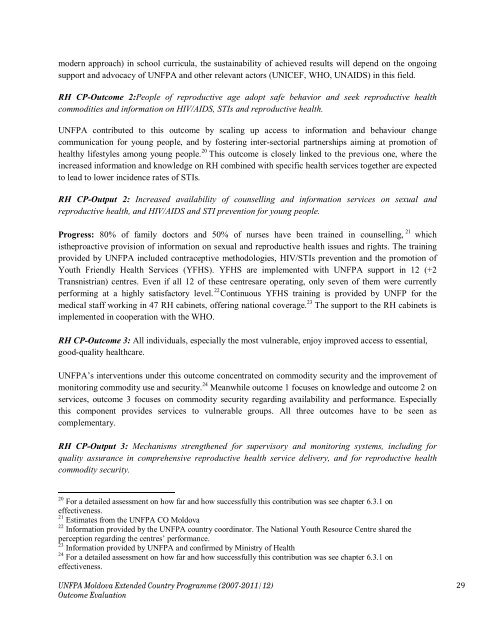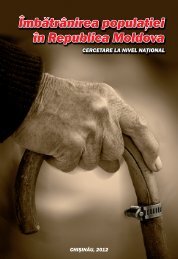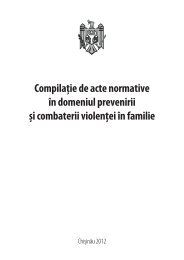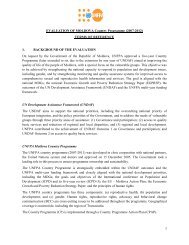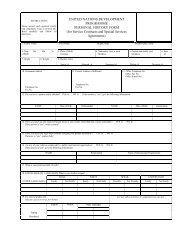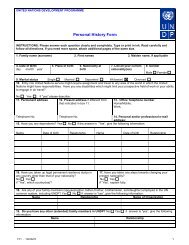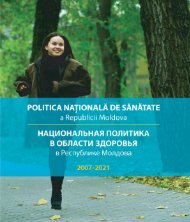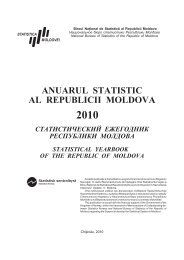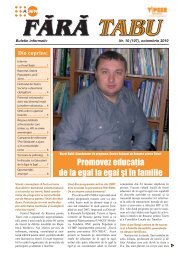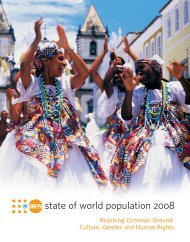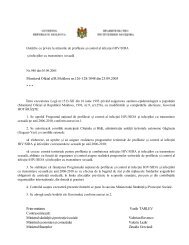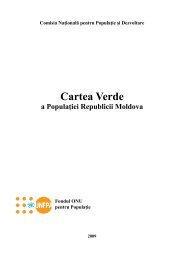Country Programme (2007-2011/2012) evaluation - UNFPA Moldova
Country Programme (2007-2011/2012) evaluation - UNFPA Moldova
Country Programme (2007-2011/2012) evaluation - UNFPA Moldova
You also want an ePaper? Increase the reach of your titles
YUMPU automatically turns print PDFs into web optimized ePapers that Google loves.
modern approach) in school curricula, the sustainability of achieved results will depend on the ongoing<br />
support and advocacy of <strong>UNFPA</strong> and other relevant actors (UNICEF, WHO, UNAIDS) in this field.<br />
RH CP-Outcome 2:People of reproductive age adopt safe behavior and seek reproductive health<br />
commodities and information on HIV/AIDS, STIs and reproductive health.<br />
<strong>UNFPA</strong> contributed to this outcome by scaling up access to information and behaviour change<br />
communication for young people, and by fostering inter-sectorial partnerships aiming at promotion of<br />
healthy lifestyles among young people. 20 This outcome is closely linked to the previous one, where the<br />
increased information and knowledge on RH combined with specific health services together are expected<br />
to lead to lower incidence rates of STIs.<br />
RH CP-Output 2: Increased availability of counselling and information services on sexual and<br />
reproductive health, and HIV/AIDS and STI prevention for young people.<br />
Progress: 80% of family doctors and 50% of nurses have been trained in counselling, 21 which<br />
istheproactive provision of information on sexual and reproductive health issues and rights. The training<br />
provided by <strong>UNFPA</strong> included contraceptive methodologies, HIV/STIs prevention and the promotion of<br />
Youth Friendly Health Services (YFHS). YFHS are implemented with <strong>UNFPA</strong> support in 12 (+2<br />
Transnistrian) centres. Even if all 12 of these centresare operating, only seven of them were currently<br />
performing at a highly satisfactory level. 22 Continuous YFHS training is provided by UNFP for the<br />
medical staff working in 47 RH cabinets, offering national coverage. 23 The support to the RH cabinets is<br />
implemented in cooperation with the WHO.<br />
RH CP-Outcome 3: All individuals, especially the most vulnerable, enjoy improved access to essential,<br />
good-quality healthcare.<br />
<strong>UNFPA</strong>’s interventions under this outcome concentrated on commodity security and the improvement of<br />
monitoring commodity use and security. 24 Meanwhile outcome 1 focuses on knowledge and outcome 2 on<br />
services, outcome 3 focuses on commodity security regarding availability and performance. Especially<br />
this component provides services to vulnerable groups. All three outcomes have to be seen as<br />
complementary.<br />
RH CP-Output 3: Mechanisms strengthened for supervisory and monitoring systems, including for<br />
quality assurance in comprehensive reproductive health service delivery, and for reproductive health<br />
commodity security.<br />
20 For a detailed assessment on how far and how successfully this contribution was see chapter 6.3.1 on<br />
effectiveness.<br />
21 Estimates from the <strong>UNFPA</strong> CO <strong>Moldova</strong><br />
22 Information provided by the <strong>UNFPA</strong> country coordinator. The National Youth Resource Centre shared the<br />
perception regarding the centres’ performance.<br />
23 Information provided by <strong>UNFPA</strong> and confirmed by Ministry of Health<br />
24 For a detailed assessment on how far and how successfully this contribution was see chapter 6.3.1 on<br />
effectiveness.<br />
<strong>UNFPA</strong> <strong>Moldova</strong> Extended <strong>Country</strong> <strong>Programme</strong> (<strong>2007</strong>-<strong>2011</strong>/12)<br />
Outcome Evaluation<br />
29


